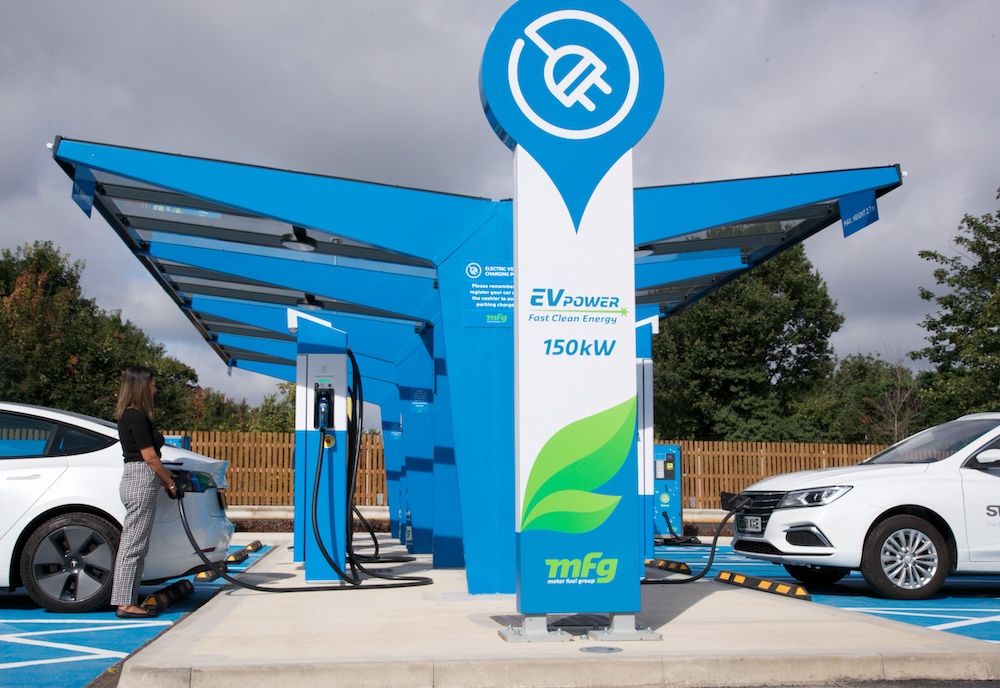HM Treasury has announced almost £73 million in combined government and industry investment for automotive R&D projects to support the development of electric vehicle technology, delivering highly skilled jobs and cementing the UK’s position as a global hub for EV manufacturing.
Supported by more than £36 million of government funding awarded through Advanced Propulsion Centre UK (APC) competitions, this includes four projects which are developing technologies for the next generation of battery electric vehicles, making them more efficient and competitive, led by companies including automotive manufacturers YASA and Empel Systems.
This funding is also supporting a project led by Integrals Power, developing and scaling up high-performance battery systems ahead of testing their mass-commercialisation, enhancing safety, power density, and cost-efficiency.
The government has already spent over £2 billion to accelerate the uptake of zero emission vehicles, including reducing the upfront cost of electric vehicles and supporting the roll-out of charging infrastructure. The UK’s first ever Battery Strategy published last year outlines the government’s plan for the UK to attract investment and achieve a globally competitive battery supply chain by 2030, with the battery sector alone expected to create 100,000 highly paid and skilled jobs in the UK.
The significant funding package for R&D and manufacturing projects announced today is targeted to support sectors where the UK is or could be world-leading and is designed to unlock investment from the private sector by providing certainty to investors.
The Government has also announced a significant investment package in the UK’s life sciences and manufacturing sectors, as part of its plan to grow the economy, boost health resilience and support jobs across the UK.
The funding will go towards several companies and projects who are making cutting edge technology in sectors key to economic growth and part of wider government support to ensure the UK is the best place to start, grow and invest in manufacturing.
This includes £7.5 million to support two pharmaceutical companies who are investing a combined £84 million to expand their manufacturing plants in the UK.
Chancellor of the Exchequer Jeremy Hunt said:
“We’re sticking with our plan by backing the industries of the futurewith millions of pounds of investment to make the UK a world leader in manufacturing, securing the highly-skilled jobs of the future and delivering the long-term change our country needs to deliver a brighter future for Britain.”
Business and Trade Secretary Kemi Badenoch said:
“Today’s announcement builds on the success of our Advanced Manufacturing plan announced last year, and will ensure we continue to grow the economy, help create jobs and secure the future of great British manufacturing. Our plan for the British economy is working – which is why firms like Airbus and BMW are continuing to bet on Britain.”
Science Secretary, Michelle Donelan, said:
“The UK’s £108 billion life sciences sector is driven by the pioneering contributions of over 300,000 highly-skilled individuals who transform lives through groundbreaking advancements in drug discovery and diagnostics.
“We fuel this progress by fostering a dynamic environment where cutting-edge technologies like AI and genomics meet world-class research to create the next generation of healthcare solutions, including in our NHS. By investing in advanced manufacturing facilities, we are protecting our communities by ensuring we can rapidly respond to future health emergencies and deliver life-saving innovations when they are needed most.”
As part of the investments announced today, almost £200 million of joint government and industry funding is also going to aerospace R&D projects, supporting the development of energy efficient and zero-carbon aircraft technology and accelerating the transition to net zero aviation.
This includes £40 million which is going towards a project developing zero-carbon aircraft engine technology – led by Cambridge-based Marshall ADG Ltd – and around £96 million is being invested in Airbus-led projects. Airbus, which manufactures almost all its aircraft wings in the UK bringing in jobs and investment to the UK economy – is developing more efficient wing designs and increasing carbon fibre production rates for wing components, reducing CO2 emissions and fuel burn.
Funding for these projects will be delivered through the Aerospace Technology Institute (ATI) programme. It was also confirmed today that the £975 million in aerospace funding over five years from 2025, announced at Autumn Statement, will be allocated to the ATI programme.
The Chancellor is also announcing up to £120 million increase to the Green Industries Growth Accelerator (GIGA) to further support expansion of low carbon manufacturing supply chains across the UK, lowering costs and accelerating the transition. The government is also confirming today that the total fund, which has now increased to almost £1.1 billion, will be split between the clean energy sectors, with around £390 million earmarked to expand UK-based supply chains for electricity networks and offshore wind sectors, and around £390 million for carbon capture, utilisation and storage and hydrogen sectors.
Energy Security Secretary Claire Coutinho said:
“We are backing our green industries with extra cash for the Green Industries Growth Accelerator – taking the total to more than £1 billion. We have long been energy pioneers in advanced manufacturing and this will allow us to carry on that great British tradition. While we have attracted £300bn in low carbon investment since 2010, with £24bn since September alone, this will help to unlock even more.”
Skills
Alongside this, the Chancellor has today set out further details of the two-year £50 million apprenticeship growth sector pilot announced at Autumn Statement.
Following engagement with the sector, from April eligible apprenticeship providers of apprenticeship standards including pipe welder, nuclear technician and laboratory technician will now benefit from targeted payments worth £3k for every start of an apprentice.
It is intended the funding will be used to support providers in making capital investment that will unlock their ability to grow and deliver the standards in scope of the pilot, such as purchasing course specific equipment, tools, and machinery that will last beyond delivery of a single apprenticeship.
This will explore ways to stimulate training and break down barriers to high-quality training in advanced manufacturing and engineering, green industries, and life sciences apprenticeships. Further detail will be set out in upcoming guidance later this month.
Today’s announcements follow £4.5 billion announced at Autumn Statement to increase investment in strategic manufacturing sectors – auto, aero, life sciences and clean energy – across the UK for five years from 2025.
APC Chief Executive Officer Ian Constance said:
“We’re committed to building the electric vehicle supply chain in the UK. By investing in the capability and expertise in this country we will grow businesses and take decisive action towards creating zero tailpipe emission technology. Our latest R&D funding does just that.”
Auto and aero winning projects include:
Advanced Propulsion Centre Collaborative R&D projects led by:
Nissan Technical Centre Europe: Building the UK R&D electric vehicle capability and enhancing the knowledge base in the UK EV battery industry as a whole.
- JLR: Developing a next generation EDU ‘toolkit’; a modular family of electric machines, inverters and transmissions for future vehicle platforms.
- YASA: Developing a dual inverter for regenerative braking in BEVs, enabling new vehicle designs with EV specific, optimised electronics and safety systems.
- EMPEL Systems: Developing a UK-designed and sourced innovative silicon carbide power module for use in high efficiency automotive inverters and DC-DC converters.
Advanced Propulsion Centre Scale-up Readiness Validation (SuRV2) competition funded by the Automotive Transformation Fund:
- Integrals Power: The scale up of high-performance, low-cost Lithium Iron Phosphate (LFP) battery chemistry, that offers superior performance including high discharge rate, improved capacity retention and rate recovery, specifically in extreme temperatures.
Image courtesy of Shutterstock.














